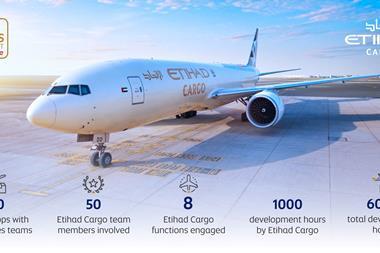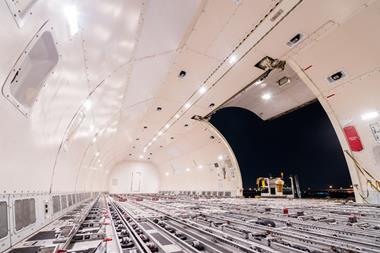Rotate is focusing on rapid product development and tackling real air cargo industry issues with practical solutions.
Data, software, and consultancy service provider Rotate launched in 2022 when a team five ex-Seabury employees identified a gap in the market.
Rotate head of product Fabien Balouzet tells Air Cargo News that the founders wanted to turn data into actionable information that will help generate new business, rather than just adding to the reams of facts and figures the industry already produces.
Balouzet’s role at the firm is to manage the relationship with customers, making sure that the products and services Rotate provides meet the needs of its users.
Balouzet himself has a good overview of the airfreight industry, having worked on both sides of the fence.
He tells Air Cargo News that after finishing a marketing internship at Air France, he discovered the world of cargo through a role at Air France KLM Cargo’s Heathrow facility on the horseshoe.
He says he quickly realised that air cargo was a people business and enjoyed the complexity and scale of the sector.
Balouzet then moved onto roles in Paris and Amsterdam and spent a total of 13 years working for the Franco-Dutch airline group’s cargo business.
Next, he moved over to the forwarding side of the industry with Flexport where he was director of partnerships for Europe, Middle East and Africa, gaining experience with a tech focused freight business.
He joined Rotate in April last year and says that having worked for both an airline and forwarder has helped him understand customer requirements.
“I joined Rotate because we’re tackling real cargo problems I’ve always wanted to solve. With a strong team blending tech and air cargo expertise, we’re making pragmatic solutions happen, and that’s what excites me,” Balouzet says.
He adds that being a new company, product development has been a key focus for Rotate and its growth has been rapid.
The company initially recruited developers and data scientists but has since expanded the customer focused side of the business.
Balouzet says that next on the agenda is an office in Asia, which is expected to open in the near future.
With the company growing quickly in terms of its people, it has also had to quickly develop its product.
Balouzet explains that to help develop the platform, Rotate has worked closely with airline partners Etihad Cargo and Cathay Cargo, as well as 100s of other users to ensure its product meets their needs.
The air cargo data market is an increasingly competitive field and in November last year the company took the decision to launch its Live Capacity tool for free.
The tool contains live updated flight data from thousands of airlines, more than 9,000 airports and over 200 aircraft types and allows users to see the amount of air cargo capacity on various trade lanes.
Balouzet says that the tool supports a range of functions within the air cargo industry, from network design to business development, benchmarking, carrier management, pricing, and market trend analysis.
The data has been “filtered, cleaned, and enriched to deliver unique, real-time insight into changes and trends in air cargo capacity”, Rotate said at the launch of the tool.
Data as a commodity
However, with air cargo data being offered for free, such as the Live Capacity platform, how does Rotate plan to distinguish itself from the rest of the market?
Balouzet admits that data has now become something of a commodity, which is why Rotate took the decision to offer its capacity data for free, something he is proud of as it democratises data and helps smaller forwarders that may not otherwise be able to afford that level insight to make business decisions.
For Balouzet, the key is not the data itself, but how airlines interpret the data and use it to make business decisions that generate revenues.
He explains that Rotate also offers premium features on the platform to help guide the decision-making process, such as capacity forecasts, alerts on capacity changes, indirect capacity overviews, a competitive position analyser, and additional data granularity, such a charter identification.
Moreover, Rotate also last year launched a consultancy division that works with airlines to use the data to develop new commercial offerings and help make operational decisions.
The consultancy team consists of nine people, which Balouzet says is the largest dedicated air cargo consultancy team in the industry.
Having a consultancy business has also helped make sure the company develops its own platform to meet requirements through feedback from within the team.
Looking ahead, Balouzet says there are several developments in the pipeline, such as solutions covering commercial fleet and network planning, and dynamic pricing, but the firm’s current main focus is on the development of its sales cockpit that analyses data to help users identify business opportunities.
“We’re deeply engaged in conversations with several airlines, fine-tuning our roadmap and validating the next set of problems to address in today’s market,” he explains.
He says that the cockpit was developed by working closely with Etihad Cargo and offers an automated platform that provides organisations with new revenue opportunities.
It has been under development since around May last year.
Balouzet says that algorithms analyse data to generate recommendations on how carriers can proactively approach customers with ideas to develop new streams, whether that’s commodity mix, new markets etc.
With a data provider answering our questions, it would be a shame to not find out about what the latest data says about current market conditions.
Balouzet says that cargo capacity is up 7% on pre-Covid times (2023 vs 2019).
He explains that while bellyhold capacity is still behind 2019 levels (-11%), freighter capacity remains strong (+12%).
Some of the most used freighters, like the B777 and the B747-400, even increased their utilisation by approximately one hour per day in the same period.















